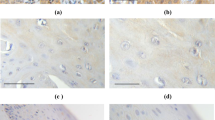Abstract
The biology and pathogenesis of vulvar carcinoma are poorly understood at present. In order to understand this disease better, we have used recently developed squamous cell carcinoma lines of the vulva as models. Two cell lines originating from two individuals (UM-SCV-1A and UM-SCV-6) were cultured in vitro in 10% fetal calf serum. The effects of interleukins 10 and 13, interferons α and γ, granulocyte/macrophage-growth-stimulating factor (GM-CSF), tumor necrosis factor α (TNFα), and transforming growth factor β (TGFβ) on the proliferation of the cells was investigated by using radioactively labelled uridine as tracer. In addition, an investigation on the molecular structure of extracted cellular DNA was carried out to investigate whether programmed cell death (apoptosis) would be inducible by any of the factors. In UM-SCV-1A cells, interleukin-10 (IL-10) and interleukin-13 (IL-13) caused an approximately 12-fold decrease in DNA synthesis in cells cultured for 72 h (P<0.001), while GM-CSF had no significant effect. TGFβ showed a significant inhibitory effect on deoxyuridine incorporation (P<0.001), which was 2.0- and 4.2-fold at 48 h and 72 h, respectively. TFGα showed a 1.2-fold inhibitory effect on DNA synthesis at 48 h (P<0.01) and a 1.5-fold inhibition at 72 h (P<0.05). Interferon γ (IFNγ) showed an inhibitory effect on DNA synthesis (1.3-fold; P<0.01). In UM-SCV-6 cells, both IL-10 and IL-13 showed inhibitory effects on deoxyuridine incorporation (1.3- and 1.4-fold at 48 h, respectively; P<0.001) that were even more pronounced at 72 h (2.4- and 2.5-fold respectively; P<0.001). IFNγ caused a 3.6-fold inhibition of DNA synthesis by UM-SCV-6 cells at 72 h (P<0.001). Both TFGβ and TNFα inhibited uridine incorporation (3.0- and 1.6-fold at 48 h, respectively; 2.7-fold at 72 h for both factors). GM-CSF inihibited DNA synthesis by UM-SCV-6 cells 1.3- 2.0-fold at 48 h and 72 h, respectively. In dose/response analyses, the effect of INFα on DNA synthesis was inhibitory in both cell lines at 48 h, while stimulatory effects were observed at 72 h. Electrophoretic analyses of DNA isolated from cells cultured in the presence or absence of different factors did not reveal DNA fragmentation. All cytokines, with the exception of IFNα, showed inhibitory effects on DNA synthesis by vulvar carcinoma cells. Of the factors studied, the recently described interleukins 10 and 13 showed potent inhibition of cell growth, encouraging further investigation on the molecular mechanisms of the observed inhibition. Apoptosis does not seem to be induced in the two vulvar carcinoma cell lines by any of the cytokines studied.
Similar content being viewed by others
Author information
Authors and Affiliations
Additional information
Received: 26 March 1996 / Accepted: 5 December 1996
Rights and permissions
About this article
Cite this article
Vihko, K., Seppänen, M., Henttinen, T. et al. Regulation of proliferation of UM-SCV-1A and UM-SCV-6 vulvar carcinoma cells by cytokines. Cancer Immunol Immunother 43, 368–374 (1997). https://doi.org/10.1007/s002620050346
Published:
Issue Date:
DOI: https://doi.org/10.1007/s002620050346




